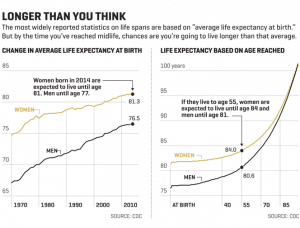The most frequently quoted statistics about life expectancy (American men born today can expect to live to 76.5 years, and women can expect to live 81.3 years) are misleading. For those in our fifties, we have already outlasted those who have passed away (they skewed the average downward). Thus, we “survivors” can expect to live much longer than the average expectancy. This is particularly true for upper middle-class people who have access to quality healthcare and healthcare information. Roger Stevens, the CEO of Westminster Communities of Florida, recommended an excellent book titled The Truth About Your Future. It suggests that you have a very good chance of living until at least 95, thanks to the advances in pharmacology, biotechnology, nanotechnology and the mapping of the human genome!

According to a recent Harvard study, older, middle-class Americans with easy access to Medicare health insurance are living longer, healthier lives—with fewer disabilities than in the past. The study credits improved medical treatment, particularly cardiovascular health and vision care.
In a review of the life expectancy study, Money magazine states:
More widespread use of statins and other heart medications has reduced disability from heart disease. And fewer seniors have impaired vision thanks to now-routine cataract surgery. Improved sight, in turn, reduces physical injury and the onset of disabilities.
The combination of increased longevity and improved health status has led to a spike in what’s called “disability-free life expectancy” among older Americans. Between 1992 and 2008, life expectancy for people aged 65 increased from 17.5 years to 18.8 years, the data show. In 1992, 8.9 of those 17.5 years were generally disability free vs. 8.6 years when seniors experienced illnesses. By 2008, the number of disability-free years rose to 10.7, while the number of years with health issues declined to 8.1.
Dr. Aubrey de Grey predicts that the first person who will live to be 200 has already been born!
What are the implications of increased life expectancy to senior living providers?
As professionals in the senior housing industry, we need to understand what it means to us that the people we serve will be leading longer, healthier lives. Some key questions that we need to ask are:
- How will Type A contracts be affected by longer lives?
- What should our healthcare component look like (CCRC at home, independent living, home health, assisted living, skilled care, memory care, rehab)?
- What will the average age of entry be in 15 years?
- How long will our residents work? How will this impact their finances? How will this affect how we build communities?
- What should we do differently in our on-site clinics and rehab?
- What will change about how we approach wellness and fitness?
Ask “Why? Why not? What if?”
Thanks to the advances in technology and healthcare outlined in this series, I believe that senior living has arrived at a pivotal moment. Great leaders recognize the moment that change is needed—and grab the opportunity. Part of how they recognize the moment is by asking themselves and others the right questions. During my research for this blog series, I witnessed the executive team of Asbury Communities in action. The team members worked hard to identify gaps in systems, culture and processes that can become barriers to becoming a nimbler company by utilizing the principles of L.E.A.D.:
L – Listen to those closest to the process
E – Engage and empower in a fun, nonanxious way
A – Ask “Why? “Why not?” and “What if?”
D – Drive to become a data-driven organization to provide more tools for smart decision-making
Doug Leidig, Asbury’s CEO, has become the team’s biggest cheerleader. “In order to illustrate the expectations I have of those who serve closest to me, I often quote Horst Schulze, former CEO of Ritz Carlton, ‘Come to work every day with a healthy dose of discontent and go home every evening reflecting on what was improved.’ I believe with all my heart that at the core of changing senior living for the better are the questions ‘Why?’, ‘Why not?’, and ‘What if?’”
Previous:
The Age of Disruption: Part IV, The Battle for Talent
The Age of Disruption: Part III, The Reasons for Growth
The Age of Disruption: Part II, The Power of Place
The Age of Disruption: Part I, The Wolf at the Door
For more information about how Love & Company can help your community stay ahead of the curve during this “age of disruption,” contact Tim Bracken at 410-207-0013, or request a free assessment!




